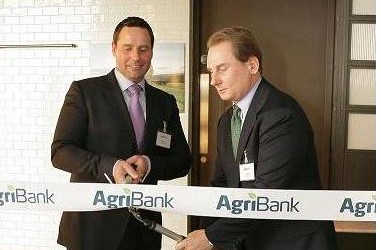
Prime Minister inaugurates AgriBank plc
AgriBank plc, the latest Malta-based commercial bank, recently commenced operations in full, a few months after obtaining a licence. AgriBank was granted a credit institution licence from the Malta Financial Services Authority (MFSA) last October and is regulated under the Banking Act.
In November, the bank informed the MFSA of its intention to passport its activities and offer services in the UK. The bank launched its UK presence last week at a reception for stakeholders and clients in central London (see photo above) and is now planning to welcome the Prime Minister to inaugurate its offices at the SkyParks Business Centre today.
The founders of AgriBank plc are Frank Sekula and Matthew Smart. Mr Sekula and Mr Smart are both British and have significant banking experience. Mr Sekula has worked with Barclays, among other banks, and Mr Smart with BNP Paribas. They come from a farming background, which is basically the origin of the AgriBank concept.
While open for business opportunities in Malta, AgriBank will mostly lend to UK farmers and agribusinesses, providing highly competitive, tailored packages to finance agricultural machinery and equipment. The bank plans to operate a traditional banking model by obtaining funding from the retail sector and lending funds to British farmers, with the comfort given by the repayment history of this industry. On the funding side, the bank’s aim is to offer savers more competitive rates than are currently offered by banks having the same model.
The bank’s lending proposition is focused mostly on agribusiness in the UK because the bank and its founders know the sector very well and understand that it is relatively low risk. On the other hand, at present, British farmers need help to invest in mission-critical machinery and equipment to stay at the forefront of their industry.
Demand for finance in the UK agribusiness sector currently outstrips supply by a long margin, mostly as a result of the vacuum being created by most of the UK high street banks, after these are opting to close their operations in niches such as the agricultural sector and concentrate on off-the-shelf products to their mainstream clients. AgriBank uses its brokers in the UK to offer a customised product to British farmers, based on their cash flow priorities and other needs.
AgriBank plans to fund the asset financing proposals by accepting funds from UK and Maltese savers. The bank has just launched its online product – fixed term bonds – for the UK, which is available across the main comparison websites. The instrument is not considered to be an eligible deposit and hence is not covered by the Depository Compensation Scheme or any other compensation scheme.
The public’s response in the first three weeks has exceeded expectations and, following this successful launch, it is expected that the number of clients will continue to rise quickly. AgriBank will match its sterling-denominated secured lending book with sterling-denominated fixed term funding products. In fact, fixed term bonds are denominated in sterling and their maturity range between three and five years, which is also the typical maturity tenor of hire purchase agreements and financial leases on the assets side, thus minimising the risks on the bank’s balance sheet.
Mr Smart and Mr Sekula are both advisors to the AgriBank Board, whose Chairman, Dr Joe Borg, is formerly Director of the Central Bank of Malta and also an ex-EU Commissioner. The other non-Executive Director is Victor Rizzo Giusti, who has been in the banking sector for the past 35 years, holding high positions with banks such as HSBC, Barclays and Lombard.
AgriBank is led by Roderick Psaila as Chief Executive Officer and Executive Director on the Board. Mr Psaila, formerly of the Central Bank of Malta, where he headed the Financial Stability Office, and Paul Grech, who is the Chief Financial Officer and Finance Director, formerly of KPMG, are both widely experienced in start-ups and this is the team’s third banking launch in the past five years.
Mr Psaila emphasised that the bank’s strategy is to operate a low risk model. He added that there is no pressure from shareholders to ramp up the business quickly and the main objective is to grow organically at the proper pace. At the same time, with no currency or interest rate risk, a very low default rate on asset financing to the UK agricultural sector, a clean balance sheet and a healthy activity on both sides of the balance sheet, AgriBank prides itself with having an extremely robust banking model.
“We are very happy with how the business is developing,” remarked Mr Psaila. “The flow of online funding is increasing and the Bank’s Credit Committee has an elevated number of proposals in its weekly meetings.
“The recruitment programme had to be accelerated, in line with incoming business, and the current team responsible from handling the core activities has gone up to ten.
“Going forward, we are confident that we will continue to offer top-quality service at advantageous rates to our clients as the operation continues to ramp up.”
The AgriBank portal, http://agribankplc.com went live in mid-February.
- March 18, 2013 2 Comments Posted in: Business





